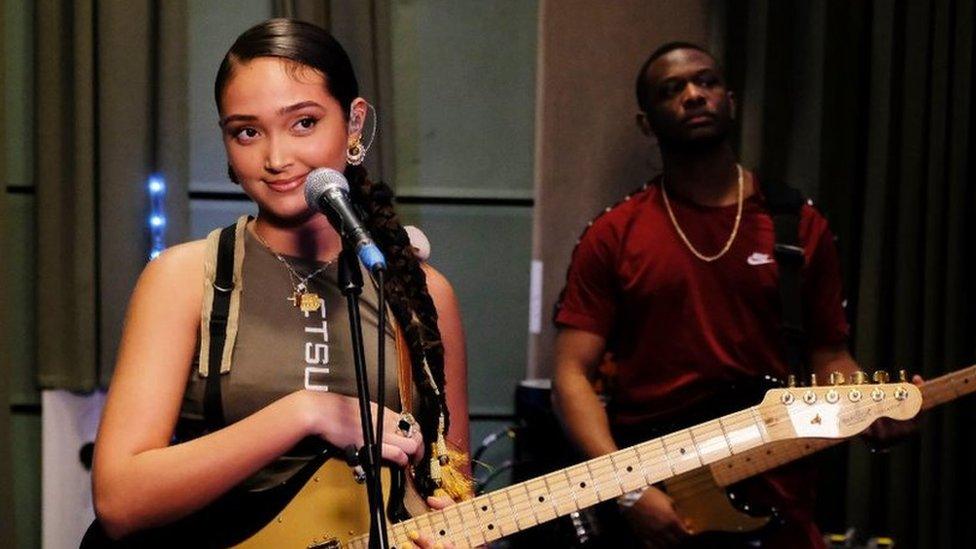Kelli-Leigh: Black soul singers can feel 'defeated' in the music industry
- Published
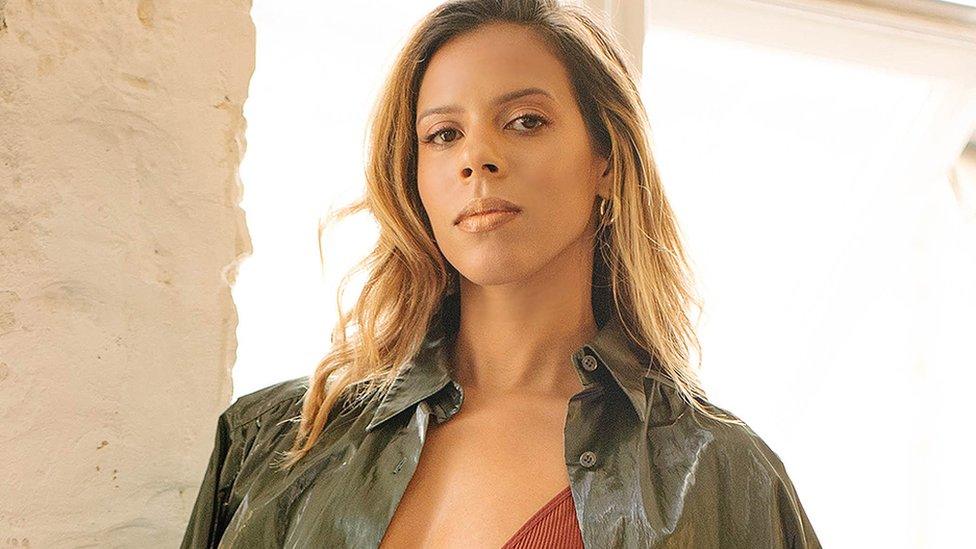
Recent conversations about racism are empowering more black women to speak about their experiences in the music industry, says singer Kelli-Leigh.
Kelli-Leigh has voiced two UK No.1 singles and a string of club hits, but has struggled to find label support for her own music.
The singer from south London wants more recognition for black women working in dance music and says it's not just her whose work is being overlooked.
"Other artists and black soul singers I've spoken to - they say the same thing," Kelli-Leigh tells Radio 1 Newsbeat.
"It's often quite a defeatist feeling. It's not right, but this is where we are and I've got to keep it moving and I've got to pay my bills."
The first big hit Kelli-Leigh worked on was Duke Dumont and Jax Jones's I Got U,, external which was No.1 in 2014.
She was hired as a session singer to provide the vocals on the track, so didn't expect credit on the song.
But she hoped the track's success would give her career the boost she wanted.
It didn't. Neither did a second No.1 that year or a Top 10 single in 2017, More Than Friends with James Hype, which did credit her.
Allow YouTube content?
This article contains content provided by Google YouTube. We ask for your permission before anything is loaded, as they may be using cookies and other technologies. You may want to read Google’s cookie policy, external and privacy policy, external before accepting. To view this content choose ‘accept and continue’.
James tells Newsbeat he wants to see more "transparency" in the dance industry.
"I think transparency is everything, to be honest. It would be great for the fans to know exactly who is behind the piece of music," he says.
"A lot of dance records rely on authentic, soulful-sounding voices and there are a lot of records where that is almost the biggest part, in dance music."
James says it was a "no-brainer" to share the song credit.
"Whether or not it was going to work, all came down to how good the vocal was on the track," James says.
"As far as I'm concerned, if it wasn't for Kelli-Leigh, that track probably wouldn't exist, or if it did, then it may not have been as successful as it was."
'Are you playing the race card?'
Earlier this week, Kelli-Leigh tweeted about her frustrations, responding to a tweet about black women in dance music.
Allow X content?
This article contains content provided by X. We ask for your permission before anything is loaded, as they may be using cookies and other technologies. You may want to read X’s cookie policy, external and privacy policy, external before accepting. To view this content choose ‘accept and continue’.

After nearly 10 years in music she now manages herself and releases solo music on her own record label, Music Core Ltd.
"Funk Butcher's tweet hit home. It struck a chord," Kelli-Leigh says.
"Sometimes it's hard to articulate yourself in the right way without thinking someone's going to go - 'Are you playing the race card?' or 'Are you playing the woman card?'
She says this is stigma all black women carry.
"We've had so many issues of subtle racism here and there that we've lived through our whole lives. A lot of us have adapted to it and ignored it," Kelli-Leigh adds.
"You get to a point where some things just don't seem like a coincidence any more. They can't be. You're not acknowledged."
Kelli-Leigh's words were praised by fans and musicians, including British producer MNEK, external and other artists who have appeared without full credit on major hits.
"This is the sad truth. Things need to change," another singer-songwriter Carla Monroe commented on Kelli-Leigh's Instagram post., external
Decades of uncredited singers
But this is nothing new.
In 1989 an Italian dance act called Black Box used a vocal sample of soul singer Loleatta Holloway on their worldwide hit, Ride On Time,, external without permission.
When copyright owners took legal action against the group, they got British singer Heather Small to re-sing the part.
Neither black woman was credited.
In 1991, a model appeared in the video to C+C Music Factory's hit Gonna Make You Sweat, lip-synching to vocals by black singer Martha Wash.
Allow YouTube content?
This article contains content provided by Google YouTube. We ask for your permission before anything is loaded, as they may be using cookies and other technologies. You may want to read Google’s cookie policy, external and privacy policy, external before accepting. To view this content choose ‘accept and continue’.
"I don't believe this is happening again,", external Martha said to her managers a few months later when Black Box used vocals she had recorded as a session singer, without credit, on one of their albums.
A session singer is someone who works with another musician on a short-term basis or for a one-off recording, and how they are paid can vary.
'Wow. This is something different'
On 2 June 2020, the music industry observed #BlackOutTuesday - inspired by the killing of George Floyd - where it closed down for a day to address internally how it could do better for its black artists and employees.
Kelli-Leigh says #BlackOutTuesday has brought conversations she's had with people in similar positions into the open.
"I was like, wow, this is something different," she says.
"This is actually all the companies joining in and saying there's an issue here, we need to think about it and we need to bring in some change.
"So much has been allowed and people have just got on with it or ignored it. Now we're at a point where people are really talking about it this week and saying 'hold on a minute, that isn't right any more'."
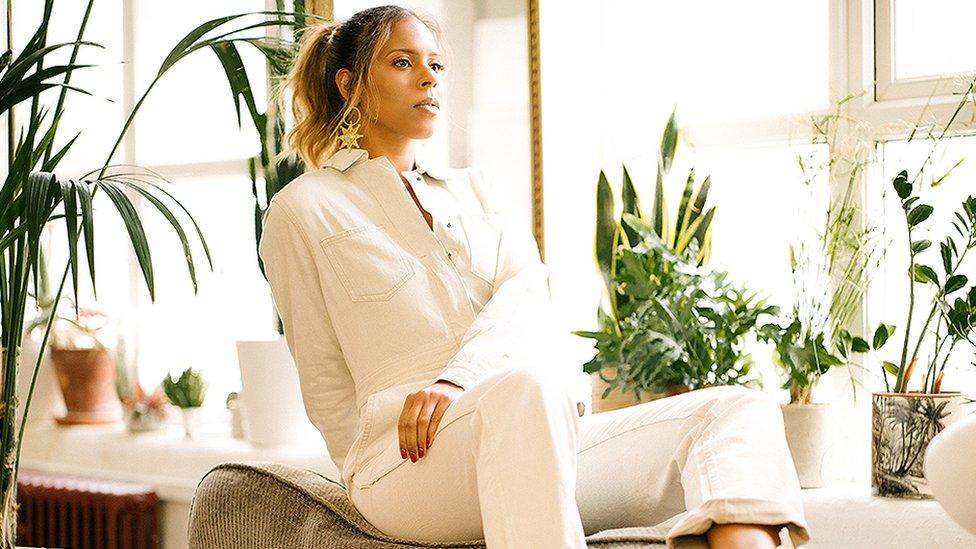
Kelli-Leigh says she hopes for record label support to see if she can achieve Top 10 success alone
The hits she's appeared on does mean Kelli-Leigh is asked every day to write and record vocals on other people's songs.
"I've made some money from being able to perform I Got U and I Wanna Feel alongside my own songs I've put out myself," she says.
"But I haven't been able to pay my bills like the people I've sung for have been able to.
"I've had to do so much more work to try and get equal respect. That's when you think, there's an injustice here."
Allow YouTube content?
This article contains content provided by Google YouTube. We ask for your permission before anything is loaded, as they may be using cookies and other technologies. You may want to read Google’s cookie policy, external and privacy policy, external before accepting. To view this content choose ‘accept and continue’.
Now, she's encouraging young black female artists to be "unashamedly bold" in what they want to do in the music industry.
"There's no time like the present to just be exactly who you are," she says. "People seem to be listening now, people seem to be really speaking out.
"Unless you stand strong and proud of who you are, and do it in an unashamedly bold, proud way, then the industry will never change."


Follow Newsbeat on Instagram, external, Facebook, external, Twitter, external and YouTube, external.
Listen to Newsbeat live at 12:45 and 17:45 weekdays - or listen back here.
- Published26 June 2019
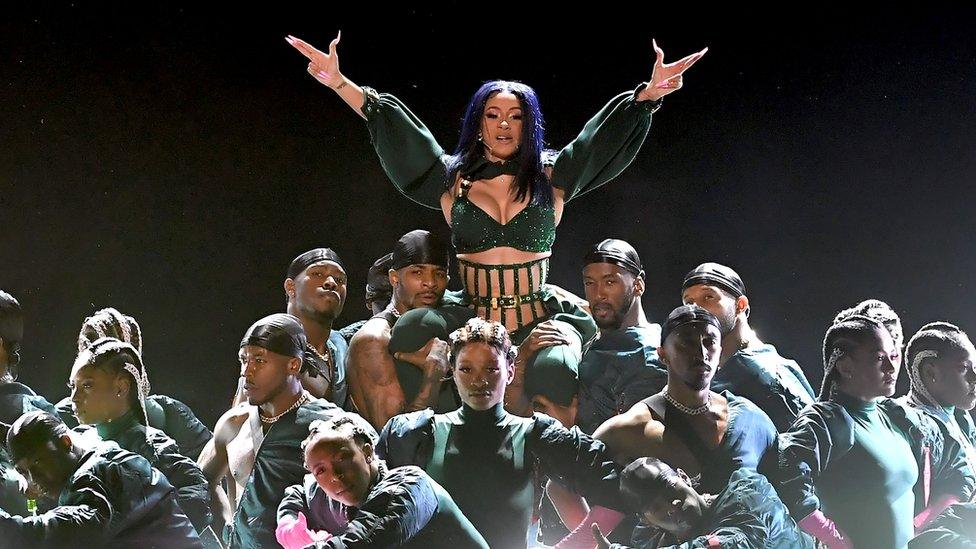
- Published20 November 2018
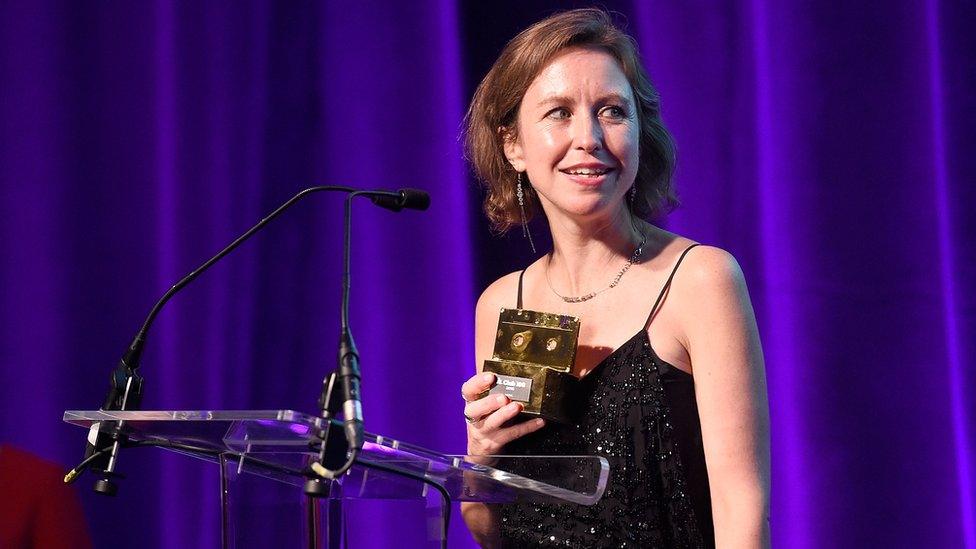
- Published16 January 2020
